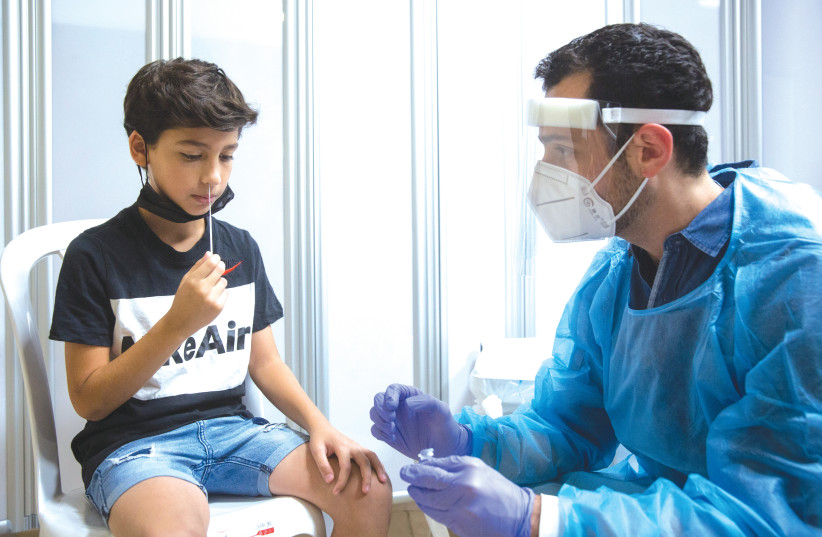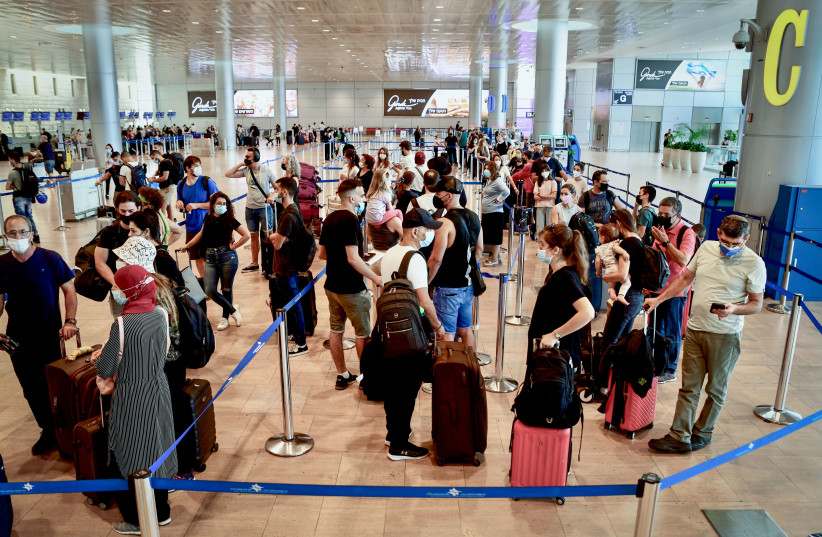Hebrew U: Serious cases to drop under 500 within next week or two

Israelis will be able to celebrate Rosh Hashanah this year without any additional restrictions, the government has said, as experts predict that serious cases will continue to decline despite an increase in the number of daily cases.
The Health Ministry has asked for Rosh Hashanah prayers to be held outdoors but if prayers are held indoors, only worshipers with Green Passes should enter synagogues when more than 50 people are present.
The Western Wall will be divided into 15 capsules and only 8,000 people will be allowed to pray at a time.
The ministry is also asking that communal and family meals be capped at 100 people (50 indoors) and ideally, they should be held outdoors.
“New restrictions are necessary,” Dr. David Dvir, head of the Primary Care Division at Meuhedet Health Fund, told The Jerusalem Post Saturday night. However, he said that “there is no capacity to enforce them and therefore no point” in rolling them out.
“I believe that we are taking a risk that we shouldn’t be taking,” said Eli Waxman, chairman of a committee of expert advisors to the National Security Council concerning the coronavirus outbreak. “Schools and holidays will increase the infection rate. Continued vaccination will decrease it. One cannot say with any certainty who will win, that is, we cannot exclude with confidence a renewed rapid rise.”
By contrast, former Health Ministry Director-General Gabriel Barbash told the Post that in view of the improving indices it is “reasonable” not to enforce any new stricter rules before the High Holy Days.
Barbash was referring to data that shows a decline in serious cases, including a report released Friday by the Hebrew University that said Israel should have fewer than 500 severe COVID-19 patients within the next week or two.

The prediction was made Friday afternoon by a team of Hebrew University researchers who have been advising the government and the National Security Council throughout the pandemic. This aligns with Health Ministry data showing a steady 12% decline in severe cases in the last week.
“It is estimated that the current wave of illness has been halted thanks to a combination of the booster shot campaign and the application of soft restrictions,” the Hebrew University team wrote in its report.
But it warned that “deviating from restrictions in mass gatherings can lead to a resurgence.”
The Health Ministry reported Friday afternoon that 11,269 people had been diagnosed with the virus in the previous day – the fifth day in a row with more than 10,000 new daily cases. On Saturday night, the ministry said that 9,739 were diagnosed.
There was a 13% average increase in new daily cases last week from the week before, according to the ministry.
Israel is still ranked first in the world for the number of cases per million inhabitants in the last seven days.
As a result of the high rate of infection, the Netherlands on Friday banned unvaccinated Israelis from entering, Portugal and Sweden, who have banned all Israelis.
Israel is now defined as high-risk by the Netherlands and therefore only vaccinated Israeli travelers, or those who qualify for a special permission, can enter.
However, according to the Hebrew University researchers, the increase in new cases is a direct result of testing children ahead of the school year and does not reflect an actual increase in morbidity. They stressed that this is not new cases of people who were infected in school, since school only opened on Wednesday, but rather, the students who were asymptomatic and screened by their parents before heading into their classrooms.
“The effect of the opening up on infection is likely to occur and will show up only in about a week,” the Hebrew University team said.
Some 8,000 students were found positive for coronavirus through home testing, the Education Ministry said Saturday night. Catching those students’ illness before they headed to school kept 180,000 other students out of isolation.
The ministry’s data is based on parent reports to schools and said it is only preliminary.
So far, only 275 teachers out of 220,000 have not been vaccinated and are refusing to be tested, the ministry added. Due to this they are prohibited from coming to school and teaching.
Some 100,000 students aged between 12 and 18 have been vaccinated in the last month at their local health fund and in addition, 4,500 students were jabbed in their schools since the start of the year last Wednesday.
Finally, 400,000 children took serological antibody tests and about 40,000 were found to have had the virus. As a result, they received Green Passes.
The biggest shift in morbidity has been among older people. The reproduction rate or “R” among those aged over 40 has dropped from 1 and stands at 0.93, the Hebrew University report said – data that aligns with numbers shared by the Health Ministry.
Only less than 10% of new daily cases in the last 30 days have been over the age of 60, compared to around 50% in the past month who were under 19.
With so many younger people becoming infected, the percentage of cases turning serious is lower – only about one in 100, which is good news for hospitals.
There were 90,750 active cases of the virus, the ministry reported Saturday evening, of whom 677 were in serious condition, among them 157 who were ventilated. Despite the Hebrew University prediction, the number of serious cases did rise from 654 on Friday.
The number of people dying from the virus has been on the rise and that total now stands at 7,153. By comparison, 606 people died in August, 52 in July, eight in June, 34 in May and 169 in April.
As reported by The Jerusalem Post
